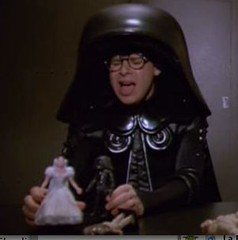We have -
Moved To:
http://professor-howdy.blogspot.com/
The E.Newspaper
By Dr. Howdy, Ph.D.
A.P.E., N.U.T.
************************
Check Out Comments -
Humor + Letters From Readers
Add Something Yourself
************************
Saturday
Big Ben's Silence Baffles Engineers

Officials do not know why the 147-year-old clock on the banks
of the River Thames stopped at 10:07 p.m. Friday. It resumed
keeping time, but stalled again at 10:20 p.m. and remained
still for about 90 minutes before starting up again, a spokes-
woman for the House of Commons said on condition of
anonymity, citing government policy.
MORE!!!

Humor Support


Take the best medicine of all for what ails you -- laughter:
"Laughter is a tranquilizer with no side effects."
--Arnold Glasow
"Laughter is by definition healthy."
--Doris Lessing
"If somebody makes me laugh, I'm his slave for life."
--Bette Midler
The human race has one really effective weapon, and that is laughter."
--Mark Twain
"What soap is to the body, laughter is to the soul."
-- Yiddish Proverb
"Laughter is an instant vacation."
-- Milton Berle
"Laughter is the shortest distance between two people."
-- Victor Borge


Friday
Cyber-Humor

A bus station is where a bus stops.
A train station is where train stops.
On my desk, I have a work station....
what more can I say..........
Thursday
Tarzan & Howdy
Two Of A Kind
CyberThought
The author Edgar Rice Burroughs used to own a ranch near Hollywood
in southern California, where he wrote his famous stories about Tarzan
of the Apes. In 1928, the town surrounding his ranch was officially
incorporated and chose for itself the name Burroughs had given his
ranch: Tarzana.
Burroughs was a prolific author with a profoundly creative
imagination. His first published story, originally titled "Dejah
Thoris, Princess of Mars," was published as "Under The Moons of Mars"
in 1912. His first Tarzan story appeared in October the same year.
In addition to 26 books about Tarzan and numerous science fiction
stories set on Mars or Venus, Burroughs also wrote caveman stories,
westerns, horror stories, and others that are harder to classify.
The town of Tarzana is a fitting memorial to this man who so enriched
American popular literature.
Tarzan's official web site!!!
UNC Humor
CyberHumor

Q: Why do UNC students put rulers on their foreheads?
A: They want to measure their intelligence.
1889: First Jukebox Installed
Cyber-Thought

The origins of the jukebox can be traced back to November 23, 1889
and an entrepreneur named Louis Glass. That's the day Glass
installed a coin-operated Edison cylinder phonograph in the Palais
Royale Saloon in San Francisco. It cost a nickel to play a single
selection from the machine, and there was no amplification or
speakers. Instead, there were four listening tubes. Despite the
technical limitations, the machine, popularly known as
"Nickel-in-the-Slot," was an instant success, earning over $1000
in less than half a year.
More about Louis Glass!!!
Keep looking at the picture
see a giraffe .... honest!!
Howdy On A Date

UNC Is Funny
Cyber Humor

A UNC grad was having some physical problems and her doctor
stated that she had to drink warm water one hour before breakfast.
At the end of a week she returned and the doctor asked if she was
feeling better. She said she actually felt worse.
"Did you drink warm water an hour before breakfast each day?"
"No," replied the UNC grad, "All I could do was about 15 minutes!"
A Common Culture in the Age of Blogging?
CyberThought

from within, conservatives launched parallel institutions of their
own. Talk radio, the Fox News Channel, the editorial page of the
Wall Street Journal, private secondary schools, religious colleges,
the burgeoning home-schooling network: all these are aspects of
a collective end-run around a liberal establishment whose favor
conservatives no longer seek to curry."

(and thus of Fox News), tried to explain this to the American Society
of Newspaper Editors. "What is happening right before us is, in short,
a revolution in the way young people are accessing news. They don't
want to rely on the morning paper for their up-to-date information.
They don't want to rely on a godlike figure from above to tell them
what's important. And to carry the religion analogy a bit further,
they certainly don't want news presented as gospel," Murdoch
argued. "Instead, they want their news on demand, when it works
for them. They want control over their media, instead of being
controlled by it. They want to question, to probe, to offer a
different angle."Terry Teachout : "Instead of staying to fight,
Americans withdrew from the battleground, went home to
cultivate their own cultural gardens--and started blogging,"
he explains.

Teachout also cites Richard Brookheiser as another cultural
observer who "gets it." Responding to Murdoch's speech,
Brookheiser explained, "Murdoch was being polite. What
he was telling his colleagues was: newspapers are dead."
They were part of the dawn, with toothpaste, coffee, and
trying to find the right sock." That world exists no more.
In its place, we are now confronted by a daunting array
of media and news sources--most made available by the
information revolution.

Terry Teachout's point is clear: "One thing of which I am
sure is that the common culture of my youth is gone for
good. It was hollowed out by the rise of ethnic 'identity
politics,' then splintered beyond hope of repair by the
emergence of the web-based technologies that so maximized
and facilitated cultural choice as to make the broad-based
offerings of the old mass media look bland and unchallenging
by comparison."

Teachout's analysis, published in the respected pages of Commentary,
signals a growing awareness of the blogging revolution and what it
means for America. In a strange twist of irony, the culture of Western
civilization may survive through the efforts of a core of dedicated
bloggers who are unwilling to see it die. The media elite will simply
have to watch from a distance, scratching their heads as they watch
their audience disappear and their influence dissipate. The long-term
impact of the blogging revolution is yet to be seen. Nevertheless,
the toppling of the mainstream media's monopoly is a cultural
achievement in itself. May the revolution continue.
MORE!!!

No Tip

UNC Cyber-Humor

Two UNC* grads were driving through Louisiana. As they were
approaching the town of Natchitoches, they started arguing
about the pronunciation of the name. They argued back and
forth until they stopped for lunch. As they stood at the
counter, one UNC grad asked the manager, "Before we order,
could you please settle an argument for us? Would you
please pronounce where we are,...very slowly?"
The manager leaned over the counter and said,
"Burrrrrrrr-gerrrrrrr-Kiiiiing."
________
*UNC is the University of North Carolina in Chapel Hill.
Specializing in a wide range of degree programs including:
B.A. A.H.F.(Advanced Hamburger Flipping), A.P.E., B.S. B.R.C.
(Bar Room Conversations), N.U.T., etc. Institution was founded
in 1898 for sons/daughters of local Chapel Still politicians that
were unable to qualify for the more prestigious institutions of higher
learning such as Duke, Wake Forest, and N.C. State University.
CyberHumor About UNC

A UNC grad's son named Morris arrived home from school
puffing and panting, sweat rolling down his face.
"Dad, you'll be so proud of me," Morris said,
"I saved a dollar by running behind the bus all the way home!"
"Morris, you are a silly boy!" said the Dad,
"You could have run behind a taxi and saved $12.00!"
CyberThought

The more I've learned about eagles, the more amazing I find them to be.
They mate for life, they build nests that will last a lifetime, they ride the
storm instead of hiding from the storm. There's really only one enemy
that is a serious danger to the eagle - a snake. That snake will attempt
to climb wherever the eagle nest is and attack the inhabitants - especially
the little eaglets. But pity the poor snake that gets caught by Mama or
Papa Eagle. They will show the serpent no mercy. They may pick it up
with their beak and violently shake it to death. Or, better yet, they will
pick it up in their talons, take off high into the air, and drop that snake
to its death on the rocks below. They are not about to let that serpent
have what he came for.
MORE!!!
LISTEN!!!

To find out how you can begin a personal relationship with Jesus Christ,
please visit YOURS FOR LIFE: HOW TO HAVE LIFE'S MOST IMPORTANT
RELATIONSHIP at:
http://www.yoursforlife.net
Or call 1-888-NEED HIM
Sacrificing Science For Homosexuality?
Cyber-Thought


Any gene that led men to prefer men as sexual partners would have
led to the extinction of its carriers. In Darwinist terms, homosexuality
is "evolutionarily maladaptive." Given this tension between evolutionary
biology and the requirements of political correctness.


Steven Pinker of Harvard skates around the question of Darwinism and
morality -- a minefield for Darwinists -- and then, of all things, suggests
a possible evolutionary cause for "homophobia." If you're confused,
you're not the only one. Pinker's floundering is what happens when
you are trying to please two equally jealous gods.
MORE!!!


Islamophobes
Freedom Of Religion
Islamic Style
Cyber-Thought


New York Mayor Michael Bloomberg's recently appointed Omar Mohammedi
to his city's Human Rights Commission.




Omar Mohammedi, "Islam isn't in America to be equal to any other faith, but
to become dominant. The Koran should be the highest authority in America,
and Islam the only accepted religion on earth.
MORE!!!




Cyber-Church

The Lord Himself will come down from heaven,
with a loud command, with the voice of the arch-
angel and with the trumpet call of God, and the
dead in Christ will rise first. After that, we who
are still alive and are left will be caught up
together with them in the clouds to meet the
Lord in the air. And so we will be with the Lord
forever. --1 Thessalonians 4
(Rapture/ Disappearance/Departure Verse)
Wednesday

Dr. Willis finished examining Matilda and went
into the hallway to talk to her husband Bernie.
"I don't want to alarm you," he said to Bernie,
"but I don't like the way your wife looks at all."
"Me neither, Doc." replied Bernie. "But she's
a great cook and real good with the kids."

To realize the value of ONE MONTH, ask a mother who
gave birth to a premature baby.
To realize the value of ONE WEEK, ask the editor of a
weekly newspaper.
To realize the value of ONE HOUR, ask the lovers who
are waiting to meet.

To realize the value of ONE MINUTE, ask a person who
missed the train.
To realize the value of ONE-SECOND, ask a person who
just avoided an accident.
To realize the value of ONE MILLISECOND, ask the
person who won a silver medal in the Olympics.
TREASURE EVERY MOMENT THAT YOU HAVE.
Treasure every moment that you have!

How "The Force" Changed Their
Lives Through The Years
Before:

After:

Before:

After:

Before:

After:
has changed actual Star Wars' Characters lives!!!
* * * Great Archives Here - - - - "Music That Howdy Enjoys" Below * * *
December 26 January 02 January 09 January 16 January 23 January 30 February 06 February 13 February 20 February 27 March 06 March 13 March 20 March 27 April 03 April 10 April 17 April 24 May 01 May 08 May 15 May 22 May 29 June 05 June 19 June 26 July 03 July 10 July 17 July 24 July 31 August 07 August 21 August 28 September 04 September 11 September 18 September 25 October 02 October 09 October 16 October 23 October 30 November 06 November 13 November 20 November 27 December 04 December 11 December 18 December 25 January 01 January 08 January 15 January 22 January 29 February 05 February 12 February 19 December 30


